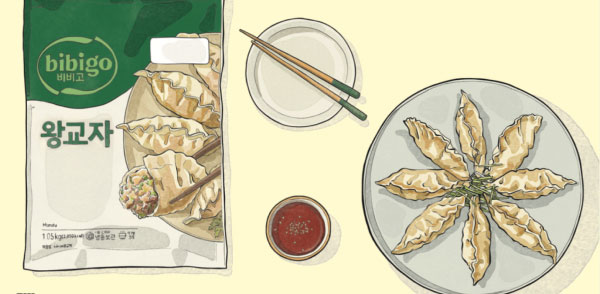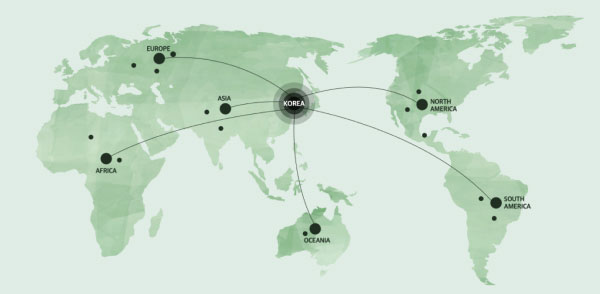in Issue & Trend
Bibigo, Making Life More
Delicious with Hansik
CJ CheilJedang’s Korean food brand Bibigo has introduced a variety of innovative products including Wang Gyoza (king-size dumplings), kimchi, and tteokbokki, spreading the flavors, values, and food culture of Korea. It was the first to pioneer overseas markets that were once devoid of Korean food, transforming K-food into a mainstream global cuisine. So, what is the secret behind Bibigo’s success? Let’s take a closer look at Bibigo, a brand that makes life more delicious.
By Hye-won Kim
The Pioneer of K-Food Globalization
In 2013, CJ officially launched the Bibigo brand with the dream of globalizing Korean cuisine. The name Bibigo comes from combining the brand’s core philosophy of “bibim” (mixing ingredients harmoniously) and the word “go,” signifying the brand’s commitment to spreading the special taste and charm of K-food worldwide.
The goal of the brand’s launch was to overcome barriers in foreign markets by focusing on products that are either ranked first or are competing fiercely for the top spot in the domestic market. CJ chose a branding strategy where all K-food products would be under the Bibigo name, making it easier for foreigners unfamiliar with Korean cuisine to associate it naturally with Bibigo. Starting with dumplings, the brand expanded to kimchi, soups, rice bowls, tteokbokki, and other categories. Currently, over 100 Bibigo products are sold in more than 60 countries worldwide.
60 countries
worldwide
100types
of Korean food products
Around KRW
680 billion US sales
for Bibigo in 2023
No. 1 in the US Dumpling Market for Four Consecutive Years
From a solid portfolio built over a decade, Bibigo’s standout product is undoubtedly dumplings. Bibigo recognized that various cultures world-wide have dishes made by wrapping fillings of meat or vegetables with dough. In 2013, it launched Wang Gyoza (king-size dumplings) in Korea, followed by other varieties like Kimchi Wang Gyoza, Shrimp Wang Gyoza, and Rice Mandu. After receiving an enthusiastic response domestically, Bibigo set its sights on overseas markets.
The US was a particularly suitable target due to its multicultural makeup, meaning less resistance to trying new foods. In the US, Bibigo made a bold move by choosing to call its dumplings “mandu” rather than the familiar term “dumpling.” This decision sought to highlight the unique qualities of Korean mandu—thin dough, filling that balances meat and vegetables, and tight packing of filling—setting it apart from the thicker-skinned Chinese-style dumplings.
CJ CheilJedang then focused on brand expansion, backed by aggressive investments. It invested nearly KRW 100 billion over several years in the US, differentiating the Bibigo Mandu brand, R&D, and manufacturing technology. A thorough localization strategy also contributed to its success. For instance, Bibigo developed chicken and cilantro dumplings catering to American preferences and launched the line, which is 100% plant-based, certified vegan.
These strategies enabled Bibigo Mandu to record global annual sales of more than KRW 1 trillion in 2020. Since 2021, Bibigo has consistently held the top market share in the US dumpling market. CJ is now producing dumplings in California, New York, and New Jersey and is expanding its frozen dumpling business to the B2B market.
Global annual sales
of more than KRW
1 trillion with Bibigo Mandu
alone in 2020
No.
1 market share in the US dumpling
market from 2021 to 2024
Towards Global Expansion of K-Food
Building on “Bibigo Dumpling Mania,” CJ is introducing K-food to the world. Last year, Bibigo launched a variety of K-Street Food items including tteokbokki, corn dogs, gimbap, gimmari (fried seaweed rolls), Bung O Pang (fish-shaped pastries), and hotteok (Korean pancakes) in major countries, establishing a new growth engine. Bibigo’s shelf-stable tteokbokki is now sold in 27 countries including the US, Australia, Vietnam, and Singapore through local ethnic markets and online malls.
The three types of Bibigo frozen gimbap—ham and vegetable, bulgogi, and kimchi cheese—launched in Japan in March last year have also gained popularity. More than 200,000 units were sold in just one month, and the product has been stocked in around 2,000 outlets including Japan’s largest supermarket chain, AEON. During the Asian Fair held at Costco in September to celebrate the launch of the new Bibigo Tuna Mayo Gimbap, all 25,000 sets sold out.
In this way, Bibigo is presenting a new paradigm in food culture as the hottest global K-style food brand. By leading growth and innovation in both domestic and international food markets, Bibigo is offering global consumers a tastier everyday experience. We look forward to seeing what Bibigo’s “next flavor” will be.


